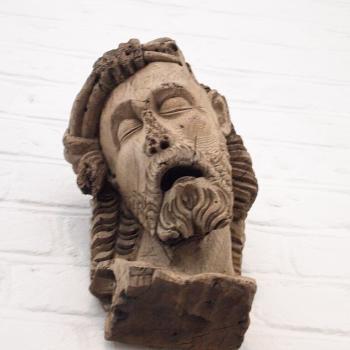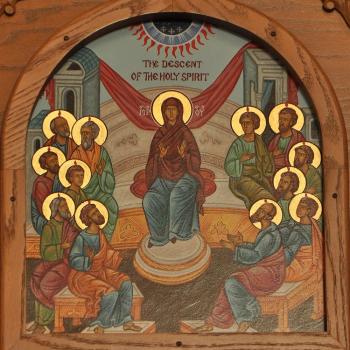![Jesus' Baptism. By anonymous (http://iac.cgu.edu/tune/tcopbaptism.html) [Public domain], via Wikimedia Commons](https://wp-media.patheos.com/blogs/sites/637/2017/06/Baptism_coptic_icon-208x300.jpg)
Then Jesus came from Galilee to the Jordan to John, to be baptized by him. John would have prevented him, saying, “I need to be baptized by you, and do you come to me?” But Jesus answered him, “Let it be so now; for thus it is fitting for us to fulfil all righteousness.” Then he consented. And when Jesus was baptized, he went up immediately from the water, and behold, the heavens were opened and he saw the Spirit of God descending like a dove, and alighting on him; and lo, a voice from heaven, saying, “This is my beloved Son, with whom I am well pleased” (Matt. 3:13 – 17 RSV).
Jesus came to be baptized, not for his own sake, but for ours; he fulfilled all the obligations of righteousness throughout his life because he was righteous. Not only was he capable of doing it, it was natural for him because had the righteousness within.[1]
Righteousness which holds itself back, which rests on its past accomplishments, no longer engages the expectations of righteousness and so becomes lost; this is why Jesus, who is righteous, continued to act and fulfill all that was expected of the righteous, not out of his need but rather because it was natural for him to do so.
By his actions, Jesus was able to bring his righteousness in contact with the rest of the world, spreading his holiness to others. Through his baptism, he turned water itself into a vessel for grace. He took the practice of baptism, as John the Baptist set it up, and refashioned it as a means by which the Holy Spirit would grant grace to others John knew that he needed what Jesus came to offer, but as the Divine Logos incorporated into himself all that was good and true in humanity unto himself, so he took on the good foundation of John, baptism, and lifted it up. By his own baptism, Jesus turned John’s baptism of repentance into the waters of rebirth, so that through baptism, one could truly become born again.
What is most striking about this event is not that Jesus was baptized, nor that he shared his holiness to the water he touched, sanctifying it and making it a vehicle of grace. What was amazing was what happened afterward: the Holy Spirit descended upon Jesus, anointing his human nature. This was not, as some have erroneous speculated, an indication that Jesus the man had become an adopted Son of God. Jesus as the Word of God was begotten, not made, the Son of God. Instead, at his baptism was the revelation of the anointing of the Spirit upon his human nature, showing us that, like Christ, we are first to be baptized and then experience the anointing of the Holy Spirit upon ourselves. His baptism not only set up the sacrament of baptism, but also its sequel, that of the anointing of the Holy Spirit, known as either the sacrament of chrismation or confirmation. He showed us the path which we are to take if we are to follow him: first to be baptized, and then to receive the confirmation of the Holy Spirit, the strengthening of our spirit through the power of the Holy Spirit.
After our new birth in baptism, we need to receive the Holy Spirit upon ourselves, to be sealed and anointed by the Spirit, for it is in this manner we opened up to our full spiritual potential with various spiritual gifts. Baptism gives us a new birth, and the reception of the Spirit opens us up to the Holy Spirit: we are able to receive the Holy Spirit which descended upon Christ’s humanity because we are joined into the body of Christ. We become partakers of the Spirit through our union with Christ. We need to open up our spiritual and physical senses, our whole being, to the Spirit so that we can receive the enlightenment it offers to those who do not quench it from their lives.
Before his baptism, Jesus, even in his humanity, certainly had a connection with the Holy Spirit, even as all life does, for it is the Lord and Giver of Life. The Spirit was involved in the incarnation itself, for it was through the Spirit that Mary was able to conceive Jesus and bear within her the Son of God made man. Likewise, in baptism, we certainly have a connection to the Spirit, so that it is working in us as its brings the grace which helps us to be spiritually reborn. Yet, there is another level of potentiality involved with the anointing of the Holy Spirit in chrismation. The anointing of the Spirit, the Seal of the Spirit, is the means by which the realization of the workings of the Spirit are revealed, confirming in us the graces which were given to us in baptism. The two, baptism and confirmation, work together, and can and should be seen as two sides of our initiation into ecclesial life. We first find ourselves incorporated into the body of Christ in baptism, and then we open ourselves up to receive the Spirit of Christ in us, so that we can be enlightened by it. Through the Spirit, through the anointing, we are able to confirm our status in Christ, to come to know who and what we are in Christ, to know our mission in the world and have the potential to fulfill it. Thus, Jesus himself only began his public ministry after his baptism, after the descent of the Holy Spirit upon him.
Jesus is the Christ, the Messiah, the Anointed One. He fulfilled in himself the anointing which was given to priests and kings of Israel in the centuries which came before him; he is, in himself, priest and king and yet something beyond them. Priests and kings were anointed with a special oil, a special chrism, which allowed them to be directed, in part, by the Holy Spirit, and in this way their lives often served as a prefiguration of the messiah to come. Christians, likewise, are to receive an anointing, to be anointed with chrism, showing that what was given to priests and kings in the past can be theirs as well – they are anointed ones in Christ. All who receive the anointing, whether they come before Christ and prefigure him and his mission, or come after and share in his anointing with chrismation, find themselves pointing to and united with Christ in his anointing. Thus, it is through this anointing, Christians are able to take on Christ and properly be called Christians, as Hugh of St. Victor explained:
We read that the unction of chrism has already been established from olden times in the Old Testament, by which at that time only kings and priests were anointed. By the anointing of these that specially anointed One was anointed before all His sharers (cf. Heb. 1), was prefigured as they who deserved to be His shares in unction had shared with Him in name. For Christ is so called from chrism and the Christian is named from Christ.[2]
We now find our very name of Christian, of being an anointed one in Christ, of being a “christ” in Christ is properly ours only if we follow the Lord in baptism and in being sealed by the Spirit with the sacrament of chrismation (confirmation). Thus, after the spiritual cleansing attained in baptism, we are expected to be sealed by the Spirit, as St. Isidore of Seville wrote:
But now, after our Lord, true king and eternal priest, was anointed by God the Father with a heavenly and mystical anointing, not only bishops and kings but the entire church is consecrated by the anointing with chrism, because of the fact that the church is a limb of the eternal priest and king. Therefore, because we are a priestly and royal people [see 1 Pet 2:9], after the washing of baptism we are anointed so that we might be called by the name of Christ. [3]
This was what St. Cyril of Jerusalem also established when he preached to those who have just been received into the Christian community. We are incorporated into the body of Christ, we are anointed with the Spirit of Christ, and so we can properly be called Christs because of the grace given to us in the sacraments of baptism and chrismation:
Having been baptized into Christ, and put on Christ , you have been made conformable to the Son of God; for God having foreordained us unto adoption as sons, made us to be conformed to the body of Christ’s glory. Having therefore become partakers of Christ, you are properly called Christs, and of you God said, Touch not My Christs , or anointed. Now you have been made Christs, by receiving the antitype of the Holy Ghost; and all things have been wrought in you by imitation , because you are images of Christ. He washed in the river Jordan, and having imparted of the fragrance of His Godhead to the waters, He came up from them; and the Holy Ghost in the fullness of His being lighted on Him, like resting upon like. And to you in like manner, after you had come up from the pool of the sacred streams, there was given an Unction , the anti-type of that wherewith Christ was anointed; and this is the Holy Ghost; of whom also the blessed Esaias, in his prophecy respecting Him, said in the person of the Lord, The Spirit of the Lord is upon Me, because He has anointed Me: He has sent Me to preach glad tidings to the poor.[4]
Jesus, therefore, sends the Holy Spirit to us, to anoint us, so that we can be said to have the Spirit of Christ in us. We are taken in to Christ, and become one of the anointed ones of God through our baptism and confirmation.
[1] Jesus, being God and man, assumed all that was natural to humanity upon himself. Sin, being unnatural, was not taken up by him. When he acted, he acted in accordance to his uncorrupted, natural humanity, so that all he did was good. Because, by nature, he knew what was good and so could do it, Jesus acted without the use of discursive reasoning, that is, he did not have to guess what he should do; he knew that if he followed his naturally good impulses, what he did would be good.
[2] Hugh of Saint Victor, On the Sacraments. Trans. Roy J. Deferrari (Cambridge: Medieval Academy of America, 1951), 302.
[3] St. Isidore of Seville, De Ecclesiasticis Officiis. Trans. Thomas L. Knoebel, PhD (New York: Newman Press, 2008),112.
[4] St. Cyril of Jerusalem, Catechetical Lecture XXI in NPNF2(7): 149.
Stay in touch! Like A Little Bit of Nothing on Facebook:
A Little Bit of Nothing












